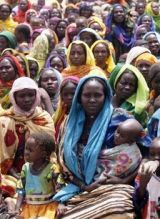Security Council sees impact of Darfur conflict in Chad
June 10, 2006 (GOUROUKOUN CAMP, Chad) — Ismail Mohamed Ibrahim pulled up his shirt and showed several U.N. Security Council ambassadors the welts on his back and head, a painful reminder of the burning plastic he said Sudanese Janjaweed militiamen used to scar him after kidnapping him and stealing his cattle near the volatile border.
 Hanang Daoud Adan Ali, representing thousands of displaced Chadian women forced to flee their homes near the Sudanese border because of attacks and rapes by the Janjaweed, which was backed by the Sudanese government, urged the U.N.’s most powerful body to bring peace _ and shelter for the rainy season which is about to begin.
Hanang Daoud Adan Ali, representing thousands of displaced Chadian women forced to flee their homes near the Sudanese border because of attacks and rapes by the Janjaweed, which was backed by the Sudanese government, urged the U.N.’s most powerful body to bring peace _ and shelter for the rainy season which is about to begin.
After spending five days in Sudan, the high-level Security Council delegation came to neighboring Chad for a firsthand glimpse of the spillover of the three-year conflict in western Darfur which has killed at least 180,000 people and forced 200,000 to flee their villages, many of which have been burned to the ground.
Chad is currently hosting 235,000 Sudanese refugees and the 15 council ambassadors flew from the capital, Ndjamena, to Abeche in the east and then to Goz Beida in the southeast, about 100 kilometers from the Sudanese border. Half the delegation visited Goroukoun Camp on the town’s outskirts where 11,500 Chadians uprooted from the border area have taken refuge _ and half visited the nearby Djabal Refugee Camp, which is home to 14,000 Sudanese refugees.
At this dusty encampment, several thousand Chadians turned out to put their case to the ambassadors. A white-turbaned man, speaking on behalf of all of the displaced, asked the council why citizens of another country were crossing the border, killing their parents, stealing their animals and taking their land.
“We need clearly a solution to this problem,” said the man, to loud applause. He was not identified by name.
Adan Ali said the Chadian government must “do its best to bring peace.”
Asked afterward what she thought about the Security Council visit, Adan Ali replied that in addition to material to stay dry during the rainy season: “I hope the Security Council will bring us peace and a solution to the problems we face today.”
Ismail Mohamed Ibrahim, 18, told reporters and several ambassadors that the Janjaweed “stole my cattle and they tied up my feet and my hands and they kidnapped me” about four months ago.
“So they put some burning hot plastic on my back and on my face as well. Since then I have terrible headaches. I feel very sick right now about what happened,” he said, describing the attack in Am Degal village near the border.
Ibrahim said he didn’t feel secure at the Gouroukoun Camp either.
Asked about the council, he said, “I think that the delegation can find a solution to give us food, and also to give us security.”
China’s U.N. Ambassador Wang Guangya, who said he had gone to see Ibrahim’s burns, said “there must be peace.”
“Without peace so many people are suffering,” he said. “The Security Council should be more proactive promoting peace in this part of the world.”
He said the leaders of Sudan and Chad should come here “to see how the people are suffering, with no water, no food.”
(ST/AP)
